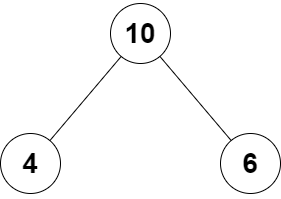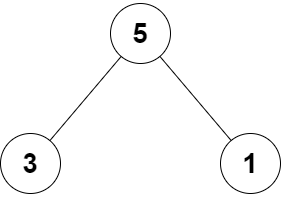Welcome to Subscribe On Youtube
Formatted question description: https://leetcode.ca/all/2236.html
2236. Root Equals Sum of Children (Easy)
You are given the root of a binary tree that consists of exactly 3 nodes: the root, its left child, and its right child.
Return true if the value of the root is equal to the sum of the values of its two children, or false otherwise.
Example 1:

Input: root = [10,4,6] Output: true Explanation: The values of the root, its left child, and its right child are 10, 4, and 6, respectively. 10 is equal to 4 + 6, so we return true.
Example 2:

Input: root = [5,3,1] Output: false Explanation: The values of the root, its left child, and its right child are 5, 3, and 1, respectively. 5 is not equal to 3 + 1, so we return false.
Constraints:
- The tree consists only of the root, its left child, and its right child.
-100 <= Node.val <= 100
Related Topics:
Tree, Binary Tree
Solution 1.
-
/** * Definition for a binary tree node. * public class TreeNode { * int val; * TreeNode left; * TreeNode right; * TreeNode() {} * TreeNode(int val) { this.val = val; } * TreeNode(int val, TreeNode left, TreeNode right) { * this.val = val; * this.left = left; * this.right = right; * } * } */ class Solution { public boolean checkTree(TreeNode root) { return root.val == root.left.val + root.right.val; } } -
/** * Definition for a binary tree node. * struct TreeNode { * int val; * TreeNode *left; * TreeNode *right; * TreeNode() : val(0), left(nullptr), right(nullptr) {} * TreeNode(int x) : val(x), left(nullptr), right(nullptr) {} * TreeNode(int x, TreeNode *left, TreeNode *right) : val(x), left(left), right(right) {} * }; */ class Solution { public: bool checkTree(TreeNode* root) { return root->val == root->left->val + root->right->val; } }; -
# Definition for a binary tree node. # class TreeNode: # def __init__(self, val=0, left=None, right=None): # self.val = val # self.left = left # self.right = right class Solution: def checkTree(self, root: Optional[TreeNode]) -> bool: return root.val == root.left.val + root.right.val -
/** * Definition for a binary tree node. * type TreeNode struct { * Val int * Left *TreeNode * Right *TreeNode * } */ func checkTree(root *TreeNode) bool { return root.Val == root.Left.Val+root.Right.Val } -
/** * Definition for a binary tree node. * class TreeNode { * val: number * left: TreeNode | null * right: TreeNode | null * constructor(val?: number, left?: TreeNode | null, right?: TreeNode | null) { * this.val = (val===undefined ? 0 : val) * this.left = (left===undefined ? null : left) * this.right = (right===undefined ? null : right) * } * } */ function checkTree(root: TreeNode | null): boolean { return root.val === root.left.val + root.right.val; } -
// Definition for a binary tree node. // #[derive(Debug, PartialEq, Eq)] // pub struct TreeNode { // pub val: i32, // pub left: Option<Rc<RefCell<TreeNode>>>, // pub right: Option<Rc<RefCell<TreeNode>>>, // } // // impl TreeNode { // #[inline] // pub fn new(val: i32) -> Self { // TreeNode { // val, // left: None, // right: None // } // } // } use std::rc::Rc; use std::cell::RefCell; impl Solution { pub fn check_tree(root: Option<Rc<RefCell<TreeNode>>>) -> bool { let node = root.as_ref().unwrap().borrow(); let left = node.left.as_ref().unwrap().borrow().val; let right = node.right.as_ref().unwrap().borrow().val; node.val == left + right } }